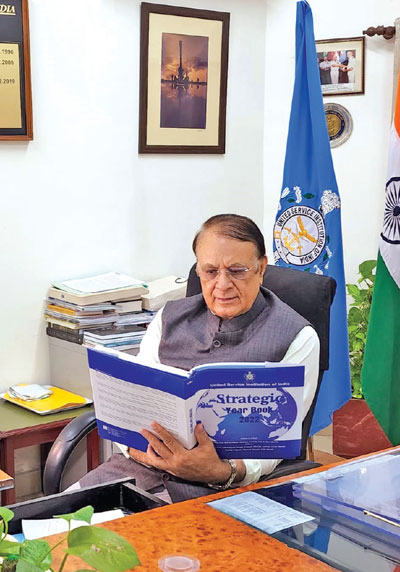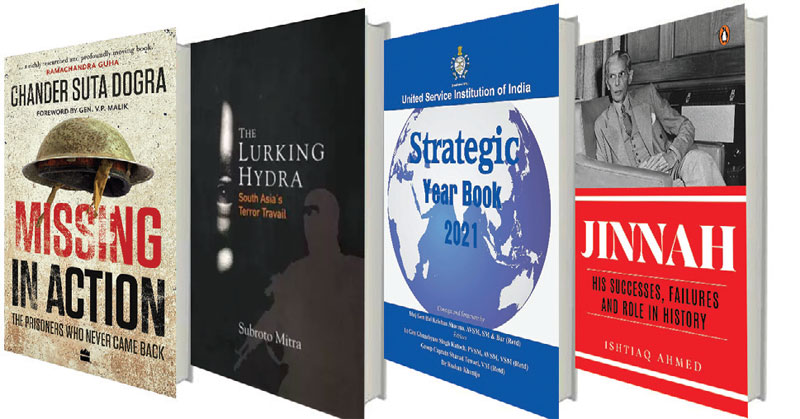Books should not be categorised as educational or entertaining. An ideal book should have both these features. Unless educative books are interesting it would be impossible to read them. And if the raciest of thrillers don’t leave us with a thought to ponder upon, they will remain in the read and throw category, not finding a place in the bookshelves. Here’s my list of recent books that have caught my attention.
Maj. Gen. B.K. Sharma (retd)

Missing in Action: The Prisoners Who Never Came Back by Chander Suta Dogra is a book on the issue of India’s soldiers missing in action (MIA). The government believes that 83 Indian soldiers are still in Pakistan’s captivity, mostly since 1965 and 1971 wars. The book is a masterpiece of investigative journalism based on the primary source material such as WikiLeaks, de-classified records, minutes of high-level meetings, interviews with senior officers who dealt with the issue, families and colleagues of those MIA.
The author brings out that Pakistan held MIAs as bargaining chips to prevent India from handing over 195 Pakistani Prisoners of war (PoWs) to Bangladesh for war crime trials. India relented by handing over 195 POWs to Pakistan without doing enough to get back its own MIA. The author opines, ‘Their poor mental and physical condition, possibly as a result of years of torture and injuries, made it difficult for Pakistan to admit their presence and return them.’ The government of India eschewed from approaching United Nations (UN) or the International Court of Justice (ICJ) maintaining that bilateral dialogue and not third-party intervention should be exercised. This got Pakistan off the hook of any international pressure. Pakistan cunningly held back some of the MIA by designating them as Indian spies that enabled it to circumvent the provisions of the Geneva Conventions.
Dogra makes a fundamental observation, ‘POWs war is a war behind the scenes, a war that is not constrained by rules or conventions, laws or treaties… where prisoners are not seen as human beings with emotions and familial ties but as pawns in never ending game blighted by hate and revenge’. The book ends on the poignant note: ‘There can never be any last word for any story about missing soldiers. Not until they are found dead or alive’. It is time we re-dedicate ourselves to accounting for every man after a situation of conflict and war.
The Lurking Hydra: South Asia’s Terror by Late Lt Gen. (Dr) Subroto Mitra is the result of having witnessed the havoc wrought by terrorism and insurgency related violence in India and its neighbourhood. The author succinctly examines array of causes of violence and its effects on intra-state and inter-state dynamics. The insidious phenomenon ultimately metastasized into a sprawling beast, threatening humanitarian security. The author makes a cogent argument for India and its neighbours to chart a future course that identifies pull, push and bridge factors that cause and sustain terrorism and makes country-wise recommendations to counter terrorism adopting a whole of society approach. The book attempts to theorise the military, economic and political responses at both national and international levels. The book stands out in a respect that author interacted on the topic of his research with the current and past policymakers and counter-terrorism specialists in South Asia. Interviews and informal discussions were focused to elicit different views, opinions, comments and criticism. This novel approach has added lustre to the publication.
The United Service Institution of India, Strategic Year Book 2022, Edited by B.K. Sharma, G.S. Katoch & Sharad Tewari has 31 comprehensively researched articles on contemporary security studies by knowledgeable Indian strategic thinkers and scholars, both from the military and civil field. This book presents strategic issues of relevance to India, of both the current time and previous year. The articles deal with security issues covering international and domestic affairs presented in six thematic sections titled ‘India’s National Security Overview’, ‘Internal Security Issues’, ‘Pakistan-China’, ‘India’s Strategic Neighbourhood’, ‘Global Issues’ and ‘National Security Capacity Building’. The articles deal with the evolving paradigm of India’s national security with the focus on core challenges and emerging opportunities. The articles deal with Kashmir and the Northeast insurgency challenges, terror finance, Pakistani and Chinese challenges, the Ukraine war, the new cold war and where and how should India align its national interests with respect to all these issues. The articles contribute to studies in the fields of international relations, geopolitics, changes in the character of war, technology, transformation, organisational changes, space, economic issues connected with defence and internal security threats and responses. The Yearbook has an article ‘National Security Capacity Building’ which is about the transformation of the Indian military compiled from the crux of talks by the three service chiefs at the USI on this subject. The Yearbook provides an increased ‘upstream’ focus on defence and security policy practices for all military and civilian practitioners in the field and those researching strategic and security issues. A book with great seminal and reference value.

Jinnah: His Successes, Failures and Role in History by Prof Ishtiaq Ahmed: Muhammad Ali Jinnah was undoubtedly one of the most fascinating political leaders of the 20th century Indian subcontinent. His successes, failures, and personal life as well as his role in history have continued to generate controversy. Having won Pakistan by invoking Islam and describing Muslims as a distinct and separate nation, those very ideas constrained the freedom of the new country to manoeuvre freely and extricate the idea and demand for Pakistan from a rigid religious identity. The author identifies four main stages in the political career of Jinnah, first as an Indian nationalist; then as a Muslim communitarian; next as a Muslim nationalist; and finally, as the founder of Pakistan. The first three stages unfold against the backdrop of British rule, and the fourth after Pakistan had come into being. The third stage is celebrated as the hallmark of his charisma to mould Muslim community thinking. For the fourth stage when Jinnah succeeded in bringing about the partition of India, he had no clear or consistent vision, or policies to offer about Pakistan as a nation state. The author underscores the intrinsic fear of perceived Indian conspiracy against him and Pakistan, which guided his behaviour. This led him to appropriate extraordinary powers and take controversial decisions that became an example for military authoritarianism in Pakistan and weakened parliamentary democracy. The landed elites, a Punjabi-dominated army and a Mohajir-led civil service came to power not despite Jinnah, but because of him. By September 1948, when he died, little had been done to set out a clear constitutional blueprint for the new state. Its undemocratic roots with the Governor General, and not the Prime Minister, being in charge did not portend well; subsequent events proved that. This is a book that clears several perceptions, answers a lot of questions and provides fresh insight into an enigmatic personality. Therein is its enduring value.

